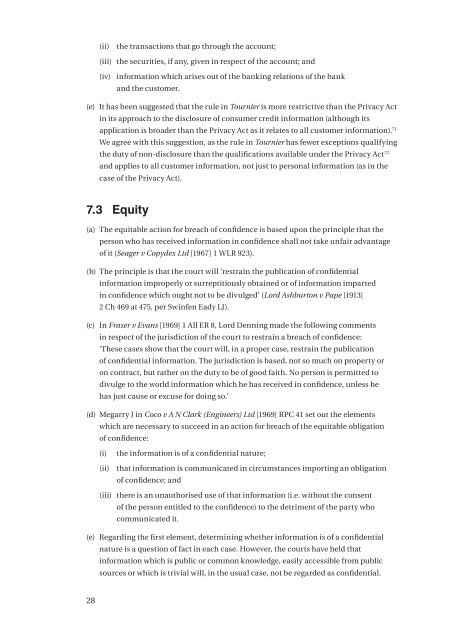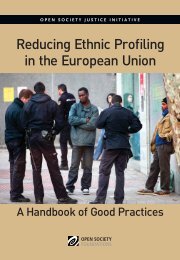Responding to the financial abuse of older people - Loddon ...
Responding to the financial abuse of older people - Loddon ...
Responding to the financial abuse of older people - Loddon ...
- No tags were found...
You also want an ePaper? Increase the reach of your titles
YUMPU automatically turns print PDFs into web optimized ePapers that Google loves.
(ii)<br />
<strong>the</strong> transactions that go through <strong>the</strong> account;<br />
(iii) <strong>the</strong> securities, if any, given in respect <strong>of</strong> <strong>the</strong> account; and<br />
(iv) information which arises out <strong>of</strong> <strong>the</strong> banking relations <strong>of</strong> <strong>the</strong> bank<br />
and <strong>the</strong> cus<strong>to</strong>mer.<br />
(e) It has been suggested that <strong>the</strong> rule in Tournier is more restrictive than <strong>the</strong> Privacy Act<br />
in its approach <strong>to</strong> <strong>the</strong> disclosure <strong>of</strong> consumer credit information (although its<br />
application is broader than <strong>the</strong> Privacy Act as it relates <strong>to</strong> all cus<strong>to</strong>mer information). 71<br />
We agree with this suggestion, as <strong>the</strong> rule in Tournier has fewer exceptions qualifying<br />
<strong>the</strong> duty <strong>of</strong> non-disclosure than <strong>the</strong> qualifications available under <strong>the</strong> Privacy Act 72<br />
and applies <strong>to</strong> all cus<strong>to</strong>mer information, not just <strong>to</strong> personal information (as in <strong>the</strong><br />
case <strong>of</strong> <strong>the</strong> Privacy Act).<br />
7.3 Equity<br />
(a) The equitable action for breach <strong>of</strong> confidence is based upon <strong>the</strong> principle that <strong>the</strong><br />
person who has received information in confidence shall not take unfair advantage<br />
<strong>of</strong> it (Seager v Copydex Ltd [1967] 1 WLR 923).<br />
(b) The principle is that <strong>the</strong> court will ‘restrain <strong>the</strong> publication <strong>of</strong> confidential<br />
information improperly or surreptitiously obtained or <strong>of</strong> information imparted<br />
in confidence which ought not <strong>to</strong> be divulged’ (Lord Ashbur<strong>to</strong>n v Pape [1913]<br />
2 Ch 469 at 475, per Swinfen Eady LJ).<br />
(c) In Fraser v Evans [1969] 1 All ER 8, Lord Denning made <strong>the</strong> following comments<br />
in respect <strong>of</strong> <strong>the</strong> jurisdiction <strong>of</strong> <strong>the</strong> court <strong>to</strong> restrain a breach <strong>of</strong> confidence:<br />
‘These cases show that <strong>the</strong> court will, in a proper case, restrain <strong>the</strong> publication<br />
<strong>of</strong> confidential information. The jurisdiction is based, not so much on property or<br />
on contract, but ra<strong>the</strong>r on <strong>the</strong> duty <strong>to</strong> be <strong>of</strong> good faith. No person is permitted <strong>to</strong><br />
divulge <strong>to</strong> <strong>the</strong> world information which he has received in confidence, unless he<br />
has just cause or excuse for doing so.’<br />
(d) Megarry J in Coco v A N Clark (Engineers) Ltd [1969] RPC 41 set out <strong>the</strong> elements<br />
which are necessary <strong>to</strong> succeed in an action for breach <strong>of</strong> <strong>the</strong> equitable obligation<br />
<strong>of</strong> confidence:<br />
(i)<br />
(ii)<br />
<strong>the</strong> information is <strong>of</strong> a confidential nature;<br />
that information is communicated in circumstances importing an obligation<br />
<strong>of</strong> confidence; and<br />
(iii) <strong>the</strong>re is an unauthorised use <strong>of</strong> that information (i.e. without <strong>the</strong> consent<br />
<strong>of</strong> <strong>the</strong> person entitled <strong>to</strong> <strong>the</strong> confidence) <strong>to</strong> <strong>the</strong> detriment <strong>of</strong> <strong>the</strong> party who<br />
communicated it.<br />
(e) Regarding <strong>the</strong> first element, determining whe<strong>the</strong>r information is <strong>of</strong> a confidential<br />
nature is a question <strong>of</strong> fact in each case. However, <strong>the</strong> courts have held that<br />
information which is public or common knowledge, easily accessible from public<br />
sources or which is trivial will, in <strong>the</strong> usual case, not be regarded as confidential.<br />
28
















